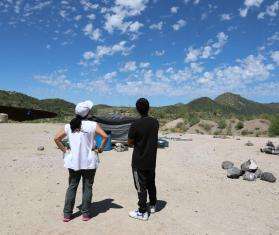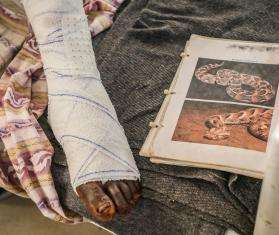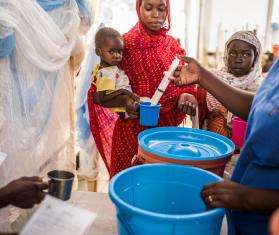NEW YORK/MUMBAI, July 17, 2024 — The Indian Patent Office recently rejected US pharmaceutical corporation Johnson & Johnson’s (J&J) application for a patent on the pediatric formulation of the lifesaving tuberculosis (TB) drug bedaquiline. This marks a significant step toward increasing affordable access to the lifesaving TB drug for children.
This July 5 decision is a result of a “pre-grant opposition” filed in December 2020 by The Delhi Network of Positive People (DNP+) and a Mumbai-based TB survivor, Ganesh Acharya, with support from Doctors Without Borders/Médecins Sans Frontières (MSF). Concerns over patent evergreening—when a company tries to extend the patent of an existing medicine by modifying it slightly—have led to several similar pre-grant oppositions against J&J in the past.
Bedaquiline is a shorter, better tolerated, and more effective TB treatment option and what the World Health Organization (WHO) now recommends for TB patients of all ages. The current recommended treatment containing bedaquiline is all-oral, six months long, and can cure up to 89 percent of people with drug-resistant TB (DR-TB). This is a vast improvement over the older treatments that had to be administered for 18 months, included daily painful injections, and often caused severe side effects.
“We welcome the news that the Indian Patent Office rejected J&J’s patent application on the pediatric formulation of bedaquiline,” said Acharya, a TB survivor and TB-HIV activist in India who filed the pre-grant opposition. “As TB activists and survivors, we are now hoping that the Indian TB program will up its game following the removal of patent barriers.”
Generic manufacturers must now do more to develop and supply the pediatric formulation to TB programs, said MSF. Additionally, the Indian government should implement the WHO’s 2022 treatment recommendations and make pediatric bedaquiline available to children with TB.
“It’s high time to ensure every child, everywhere has access to life-saving early TB diagnosis and treatment,” said Dr. Aparna Iyer, project medical referent at MSF’s Mumbai DR-TB project. “With 1.3 million children and young adolescents developing TB globally in 2022 according to the WHO—of whom 135,000 children between birth and 14 years were in India—governments need to do more to ensure effective TB and DR-TB treatment reaches all children in line with the WHO’s treatment recommendations.”
This follows a similar decision made by the Indian Patent Office in March 2023 when it blocked J&J from attempting to patent the salt form of bedaquiline. Following this rejection, national TB treatment programs from Ukraine and Belarus requested J&J to drop its secondary patents in their countries and others heavily affected by TB. Additionally, the South African Competition Commission launched an investigation into J&J's evergreening patenting practices and anti-competitive pricing conduct.
The pressure—a testament to the effort of TB activists, civil society, and countries putting public health over corporations’ interests—worked and J&J announced they would not enforce patents on the drug in 134 low- and middle-income countries. Prices dropped by over 50 percent with generic companies competing with J&J in bids to supply the drug to the Global Drug Facility.




